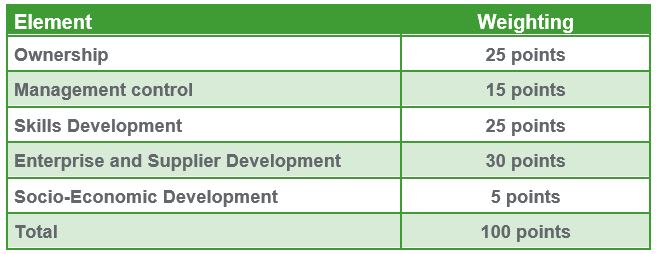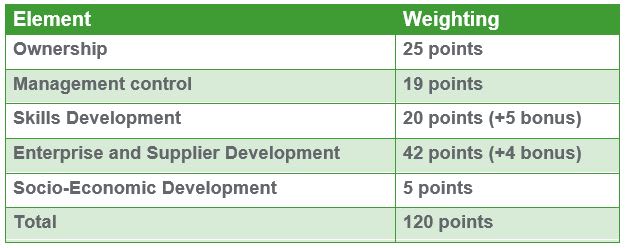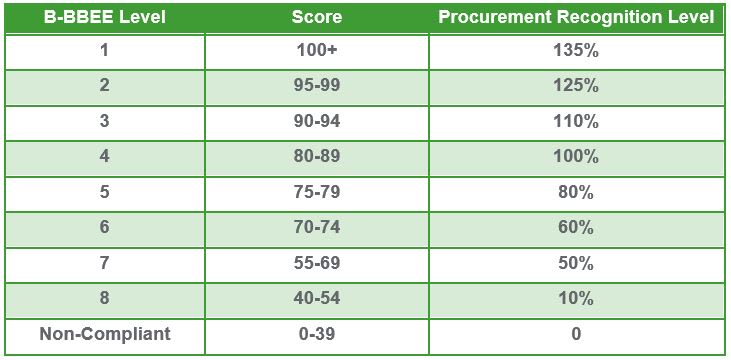B-BBEE Frequently Asked Questions
Broad-Based Black Economic Empowerment(B-BBEE) is a Government policy to advance economic transformation and enhance the economic participation of Black people.
The Constitution of the Republic of South Africa [No. 108 of 1996], provides all people in South Africa the right to equality. However, despite the right to equality, not all people in South Africa are born to equal circumstances. The history of South Africa has resulted in economic disparity based on race and has resulted in many Black people in South Africa not enjoying the same opportunities.
The purpose of B-BBEE is to address the legacy of apartheid and bridge the gap between formal and substantive equality. The aim is to promote economic participation and ensure that all people in South Africa enjoy the right to equality.
B-BBEE is governed by:
- The Broad-Based Black Economic Empowerment Act, 2003 (as amended)
- The Generic Codes of Good Practice on Broad-Based Black Economic Empowerment (B-BBEE Codes), as amended and certain sector-specific Codes of Good Practice (Sector Codes)
- An entity operating in a sector with a Sector Code will be governed by that Sector Code.
B-BBEE compliance is not a legislative requirement. While an entity is not likely to be penalised for failing to embrace broad-based transformation or for having a low B-BBEE score, it may be subject to other limitations, for example an entity may be required to be a certain level to secure contracts and licences by the Government. In addition, it is unlikely that an entity will be unable to go to tender without a valid B-BBEE Certificate, but it may find itself penalised if it has an unfavourable certificate. Because an entity’s B-BBEE certificate impacts its customer’s procurement scoring, it may find that it is pressurised by its clients to have a level of compliance.
A B-BBEE certificate, is the certificate that is issued at the end of the verification process summarising the results of the verification. The certificate includes indicators such as the size of the entity, the level of black ownership and its overall B-BBEE status. The certificate is valid for a year and is renewed annually based on evidence submitted for B-BBEE verification.
The B-BBEE Codes define “black people” as follows:
“Black people is a generic term which means Africans, Coloureds and Indians–
- Who are citizens of the Republic of South Africa by birth or descent; or
- Who became citizens of the Republic of South Africa by naturalization:
- Before 27 April 1994; or
- On or after 27 April 1994 and who would have been entitled to acquire citizenship by naturalization prior to that date.”
On 18 June 2008, the Chinese Association of South Africa approached the High Court with a request that South African Chinese people be included in the definition of “black people”. This relief was granted and, as such, “black people” for purposes of Broad-Based Black Economic Empowerment (B-BBEE) now refers to Africans, Coloureds, Indians and a select number of Chinese people.
The Generic Codes of Good Practice categorise entities based on their turnover:
 It is important to note that thresholds may differ between Sector Codes.
It is important to note that thresholds may differ between Sector Codes.
Exempted Micro Enterprise (“EME”)
- EME’s are not measured using a scorecard
- EME’s are considered, by default, as "Level Four Contributors", with a B-BBEE recognition level of 100%. There are, however, exceptions to this general rule:
- If an EME is 100% black owned (using Flow through principle meaning voting rights or economic interest held by the natural persons), it qualifies as a "Level One Contributor", with a B-BBEE recognition level of 135%.
- If an EME is at least 51% black owned (using Flow through principle meaning voting rights or economic interest held by the natural persons), it qualifies as a "Level Two Contributor", with a B-BBEE recognition level of 125%.
- EMEs are required to prepare and submit an affidavit annually confirming their annual total revenue does not exceed R10million as well as indicate the percentage of Black Ownership.
- Qualifying Small Enterprise (“QSE”)
- QSE’s are measured using the B-BBEE Scorecard
- There are, however, exceptions to this general rule:
- If a QSE is 100% black owned (using Flow through principle meaning voting rights or economic interest held by the natural persons), it qualifies as a "Level One Contributor", with a B-BBEE recognition level of 135%.
- If a QSE is at least 51% black owned (using Flow through principle meaning voting rights or economic interest held by the natural persons), it qualifies as a "Level Two Contributor", with a B-BBEE recognition level of 125%.
- QSE’s with less than 51% Black Ownership are required to comply with all five elements of the scorecard.
- QSE’s are required to achieve a subminimum target of 40% for two of the three priority elements, one of which being Ownership and the other being a choice between Enterprise and Supplier Development or Skills Development.
- A QSE that does not meet the subminimum will be discounted a level.
- The QSE Scorecard:
 This scorecard may differ between Sector Codes
This scorecard may differ between Sector Codes
- Generic Enterprise
- Generic Enterprises are measured using the B-BBEE Scorecard.
- Generic Enterprises are required to comply with all five elements of the scorecard, namely:
- Ownership
- Management Control
- Skills development
- Enterprise and Supplier Development
- Socio-Economic Development
- It is mandatory for Generic Enterprises to achieve a sub-minimum target of 40% for each of the three priority elements, namely, Ownership; Skills Development and Enterprise and Supplier Development.
- A Generic Enterprise that does not meet the subminimum requirements, will be discounted a Level.
 This scorecard may differ between Sector Codes
This scorecard may differ between Sector Codes
QSE and Generic Enterprises, receive a B-BBEE Level of Compliance once their verification is complete. The Procurement Recognition Level is the amount recognised in terms of spend from a B-BBEE Supplier. The better the B-BBEE Level, the more spend is allocated to that supplier on the Procurement Scorecard. Most entities wish to procure from B-BBEE Compliant suppliers with a Level 4 or greater. In that way, they are able to count between 100% and 135% on their procurement scorecard.


